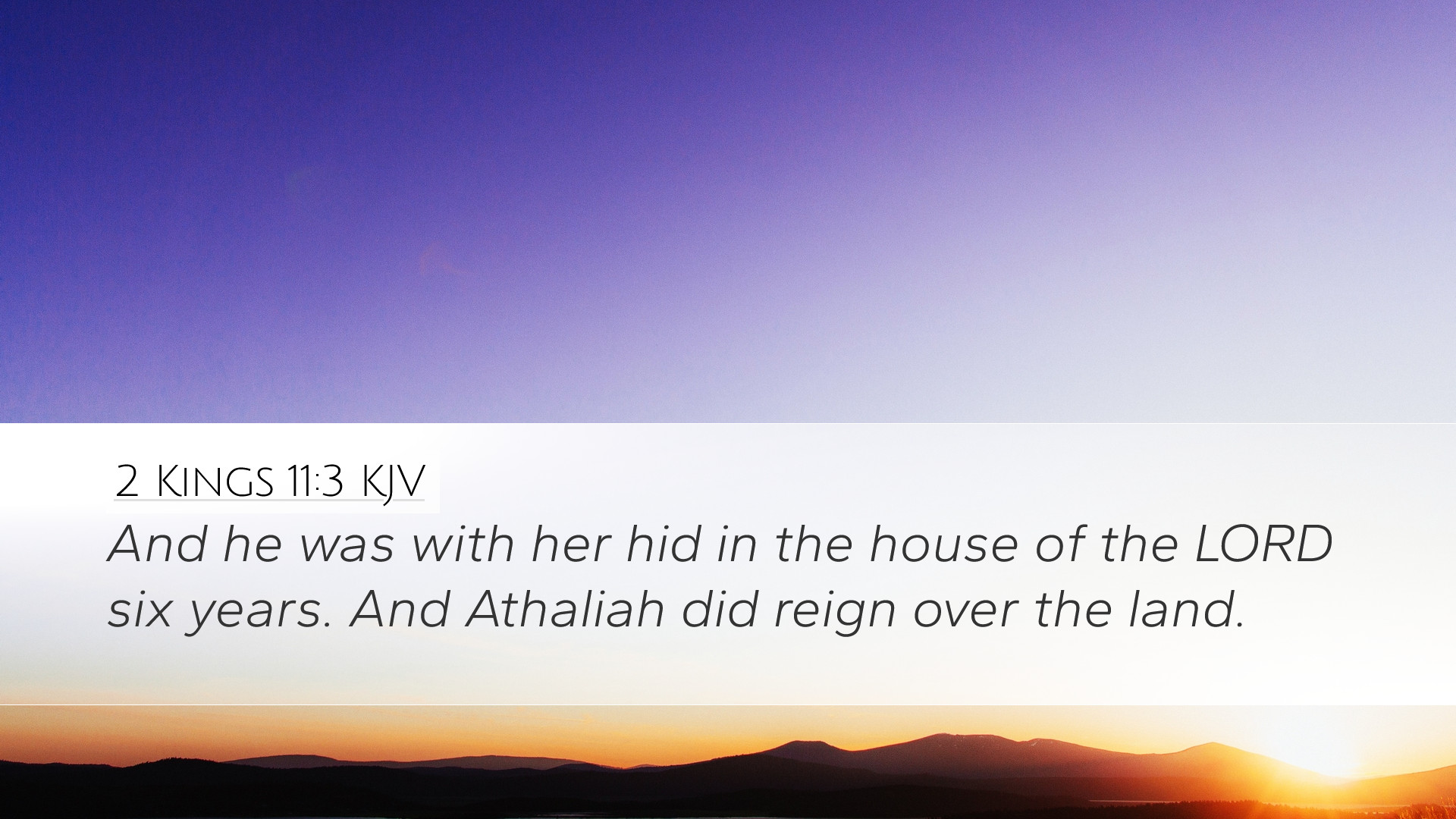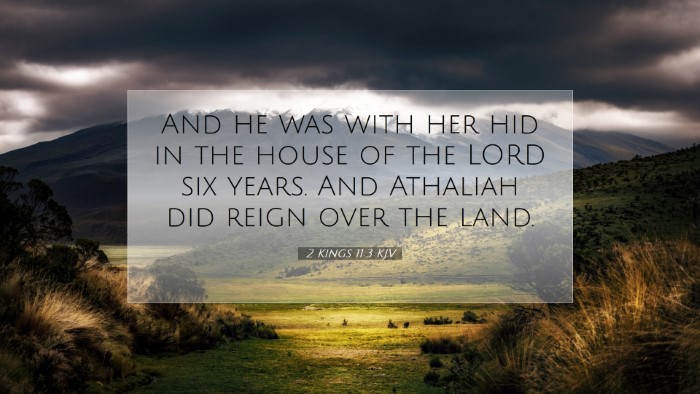Old Testament
Genesis Exodus Leviticus Numbers Deuteronomy Joshua Judges Ruth 1 Samuel 2 Samuel 1 Kings 2 Kings 1 Chronicles 2 Chronicles Ezra Nehemiah Esther Job Psalms Proverbs Ecclesiastes Song of Solomon Isaiah Jeremiah Lamentations Ezekiel Daniel Hosea Joel Amos Obadiah Jonah Micah Nahum Habakkuk Zephaniah Haggai Zechariah Malachi2 Kings 11:3
2 Kings 11:3 KJV
And he was with her hid in the house of the LORD six years. And Athaliah did reign over the land.
2 Kings 11:3 Bible Commentary
Commentary on 2 Kings 11:3
Bible Verse: "And she was hid with him in the house of the Lord six years: and Athaliah did reign over the land."
Context and Background
The events of 2 Kings 11 unfold in a troubling period for the nation of Judah. Athaliah, the daughter of Ahab and Jezebel, had usurped the throne after the death of her son, Ahaziah. This wicked queen sought to eradicate the royal line of Judah by executing her own grandsons. However, the providence of God intervenes through Jehosheba, the sister of Ahaziah, who clandestinely rescued Joash, a royal heir, and hid him in the temple. This chapter is pivotal not only for its historical implications but also for its theological significance regarding divine preservation and faithfulness.
Analysis of the Key Themes
- The Preservation of the Davidic Line: The survival of Joash is integral to the fulfillment of God's promise to David—that his line would endure. As noted by Albert Barnes, God's covenant with David is underscored in this narrative, showing that even amidst the most dire circumstances, God remains sovereign.
- The Role of Women in God's Plan: The actions of Jehosheba highlight the crucial role women play in biblical history. Adam Clarke emphasizes her bravery and cunning, stating that through her act of deception, she became an instrumental figure in preserving the messianic lineage.
- The Sovereignty of God: Throughout the narrative, one can observe the hand of God orchestrating events behind the scenes. Matthew Henry speaks to the inscrutable nature of God's providence, illustrating that God often works in unexpected ways to fulfill His designs, safeguarding Joash in the temple for six years.
Commentary Insights
1. Athaliah's Wicked Reign
Athaliah's reign is characterized by idolatry and bloodshed. Commencing her rule with the slaughter of royal children, she exemplifies the corrupt nature of leadership that opposes God's will. Henry notes that her actions serve as a stark warning against the perils of unchecked power and moral decay in leadership.
2. Jehosheba's Courage
Jehosheba, the wife of Jehoiada the priest, appears as a central figure in this drama. Her decision to hide Joash demonstrates remarkable faith and courage. Clarke asserts that her timely intervention was crucial, reflecting a faithfulness that stems from a deep understanding of God's promises to Israel. Her actions exhibit a profound sense of responsibility towards her family's legacy and God's covenant.
3. The Craft of Hiding
The act of concealing Joash for six years in the temple is not merely a physical protection but symbolizes being hidden in God's presence. Barnes highlights the importance of the temple as a place of refuge, drawing parallels to other scriptural instances where God’s people find safety and solace in Him amidst tribulation. This metaphor enriches the understanding of divine protection and spiritual safeguarding.
Theological Implications
This narrative brings to light significant theological implications regarding God's unwavering commitment to His covenants. Despite human rebellion and moral failures, God's purposes prevail. The preservation of Joash becomes a foreshadowing of Christ, the true King, who ultimately reigns forever. The commentary by Henry reveals a consistent theme that while human history may seem chaotic, God's redemptive plan unfolds precisely according to His divine timetable.
Practical Applications
- Trust in God's Sovereignty: As believers, we are reminded to trust in God's sovereignty even when circumstances appear bleak. The hiddenness of Joash serves as a reminder that God is working in our lives, often unseen.
- The Importance of Faithful Leadership: Jehosheba's actions highlight the necessity for faithful leadership within families and communities. This narrative calls for discernment and courage to stand against immorality and protect the next generation.
- God’s Protection of His People: The story instills hope that God protects His people, sometimes through means that we may not immediately perceive. It encourages believers to seek refuge in God during turbulent times.
Conclusion
The account of 2 Kings 11:3 serves as a profound narrative demonstrating God's protective hand over the Davidic line amidst the chaos of Athaliah’s reign. It invites pastors, students, and scholars to reflect on the themes of divine sovereignty, the courage of faithful individuals, and the importance of God's promise throughout history. Ultimately, this passage reminds us of the overarching narrative of scripture—God’s faithfulness in preserving His plan of redemption.


